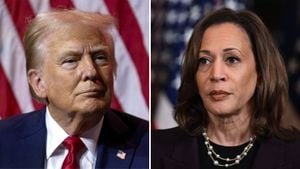Elon Musk is clashing with OpenAI CEO Sam Altman over the Stargate artificial intelligence infrastructure project touted by President Donald Trump, the latest development in the annual rivalry between these two tech billionaires. On January 21, 2025, Trump announced the ambitious Stargate venture alongside major players like OpenAI, Oracle, and SoftBank, promising to invest up to $500 billion to bolster AI infrastructure across the United States. The project aims to build data centers and related facilities, heralded by Trump as "a resounding declaration of confidence in America’s potential."
During the White House press conference, Trump stated, "This is to me a very big thing," citing the immediate investment of $100 billion as part of the larger initiative. According to reports, Altman and Larry Ellison of Oracle are poised to lead operations, with SoftBank’s Masayoshi Son integral to financing the effort. This ambitious initiative is not only set to create AI capabilities but also promises to generate over 100,000 jobs.
Hours after the announcement, Musk took to X (formerly known as Twitter) to express his skepticism about the financial integrity of the venture. He stated bluntly, "They don’t actually have the money; SoftBank has well under $10 billion secured. I have this on good authority." This vocal criticism has reignited longstanding tensions between Musk and Altman, who have been embroiled in conflicts since Musk's departure from OpenAI and especially since Musk initiated multiple lawsuits against the company.
Altman responded to Musk's provocations, inviting him to visit the construction site of the first data center in Texas and asserting, "I realize what is great for the country isn’t always what’s optimal for your companies, but I hope you’ll mostly put America first." His use of emoji representing the U.S. emphasized the nationalistic angle of the Starge project, aiming to reposition America as a leader in AI technology, particularly as it competes against rivals like China.
The Stargate project itself is not entirely new. Tech outlet The Information reported its inception as early as March 2024, indicating foundational preparations made by other entities. Notably, Crusoe Energy Systems announced the construction of specialized AI data centers, which will largely rely on renewable energy sources such as solar power. Michael McNamara, CEO of Lancium, the energy tech company managing the site, remarked, "We will deliver the maximum amount of green energy at the lowest possible cost."
Despite the ambitious plans, apprehensions linger over whether the project will fulfill its financial promises. During Trump’s previous term, he often touted massive investments by corporations which failed to materialize or were simply rehashed declarations meant to curry favor with the administration. One notable example includes the unfulfilled promises from SoftBank to invest heavily across multiple sectors, raising eyebrows once again with its fresh commitment to the AI industry.
Microsoft, having historically aligned itself with OpenAI, appears to be absent from the limelight of the recent announcement. Although Microsoft has expressed plans to invest and build upon its existing collaborations with OpenAI, CEO Satya Nadella humorously remarked, "I’m good for my $80 billion", referencing Microsoft's own $80 billion pledge to build global AI infrastructure. He diverted from addressing Musk's issues directly, indicating possible fragmentation within AI partnerships.
Historically, Musk has held close affiliations with Trump, being one of his advocates throughout the prior campaign; nonetheless, this clash raises doubts about his role and influence within the newly minted administration. His new government position overseeing cost-saving initiatives might be seen as conflicting with the competitive nature of AI developments. Critics suggest Musk may use his platform to influence regulations and funding for projects related to his ventures, particularly Tesla and SpaceX.
On the other hand, as tension simmers, it’s apparent the stakes are high not only for these tech leaders but also for the United States' position on the global stage. The shift toward AI technology is perceived as pivotal, with national security and economic competitiveness resting heavily on the outcome of initiatives like Stargate. Should this project move forward successfully, it may maintain or even augment America’s foothold as the world leader in AI.
The growing animosity between Musk and Altman is telling of the larger narrative surrounding technological supremacy. Musk’s establishment of xAI is indicative of his desire to reclaim influence within the rapidly progressing AI sphere. He claims unfair competition from OpenAI, previously co-founded by him, exemplifying the contentious relationships spawned from the entrepreneurial ecosystem the AI industry cultivates.
Overall, as Trump champions the Stargate initiative, ambitions collide with skepticism, leaving much to be seen about the financial viability of such massive promises and the potential for rivalry among leading tech giants as they scramble for dominance in the lucrative AI arena.



